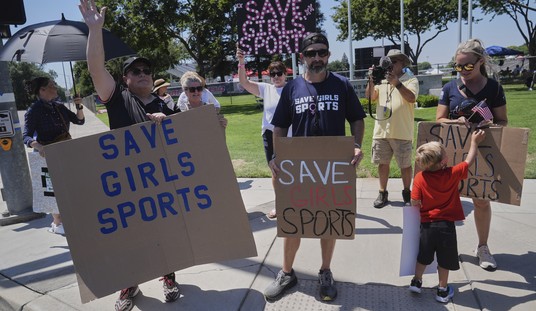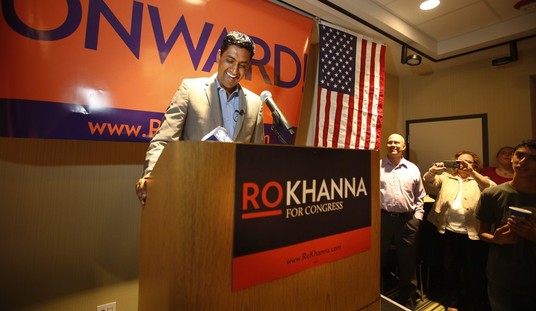The US finally got NATO to take command of Operation Odyssey Dawn yesterday, ridding the kinetic military time-limited, scope-limited military action of its singular leadership and devolving it to a committee. The New York Times reports today that the committee is off to just the start one might imagine, with no one quite sure what the objectives, policies, or even players in the conflict might be:
“From the start, President Obama has stated that the role of the U.S. military would be limited in time and scope,” Secretary of State Hillary Rodham Clinton said Thursday evening in announcing the plan.
But even that agreement — brokered by Mrs. Clinton and the foreign ministers of Britain, France and Turkey — frayed almost immediately over how far the military campaign should go in trying to erode the remaining pillars of Colonel Qaddafi’s power by striking his forces on the ground and those devoted to protecting him. It was salvaged, one diplomat said, only by papering over the differences concerning the crucial question of who actually controls military strikes on Libya’s ground forces.
“There were differences in the scope of what NATO would do and what would remain with the national militaries,” a senior administration official said, expressing hope that the agreement on NATO command would be a step toward resolving them.
The questions swirling around the operation’s command mirrored the larger strategic divisions over how exactly the coalition will bring it to an end — or even what the end might look like, and whether it might even conceivably include a Libya with Colonel Qaddafi remaining in some capacity. While few countries have openly sided with the Libyan leader, officials said on Thursday that most of the allies expected that the use of military force would lead to talks between the government and the rebels.
Why do I suspect that the command leadership decisions will use this process?
Former NATO commander and retired Joint Chiefs vice-chair Joseph Ralston disputes whether any no-fly strategy on its own will meet any of the objectives. Ralston pointed out that 12 years of a no-fly zone didn’t eject Saddam Hussein from power, nor did it keep him from wreaking havoc on Marsh Arabs, Kurds, and Shi’ites in the south. France’s foreign minister countered that “the destruction of Gaddafi’s military capacity is a matter or days or weeks, certainly not months,” but that’s technically not in the scope of the mission — and as Ralston reminds us, it wasn’t the outcome of 12 years of no-fly operations in Iraq.
Plus, we’re still not sure who the rebels are that we’re trying to protect. Pajamas Media and the Weekly Standard have identified one commander in eastern Libya whom we do know pretty well, because we captured and detained him for years after he fought for the Taliban in Afghanistan:
Qaddafi and other Libyan officials have claimed that a former Guantanamo detainee named Abdul Hakim al Hasadi has set up an Islamic emirate in eastern Libya. There’s just one problem: Abdul Hakim al Hasadi was never held at Guantanamo.
This doesn’t mean that al Hasadi, who says he is in charge of defending Derna, is necessarily a benign actor. In a recent interview with the Il Sole, an Italian publication, al Hasadi explained: “I have never been to Guantanamo. I was captured in 2002 in Peshawar in Pakistan, while I was returning from Afghanistan where I fought against the foreign invasion. I was handed over to the Americans, and held for a few months in Islamabad, delivered to Libya, and released in 2008.”
So, by his own account, al Hasadi joined the jihad in Afghanistan. There’s more. Il Sole asked al Hasadi about the jihadists sent from Iraq to Libya to fight.
“I sent over about 25,” al Hasadi told Il Sole’s reporter. “Some came back, and today are on the Ajdabiya front; they are patriots and good Muslims, not terrorists. I condemn the September 11 attacks, and attacks against innocent civilians in general. But the members of al Qaeda are also good Muslims, and are fighting against the invader.”
This doesn’t inspire confidence. While dismissing his ties to al Qaeda and condemning the September 11 attacks, al Hasadi concedes that he fought in Afghanistan, sent 25 more jihadists to fight in Iraq, and calls al Qaeda members “good Muslims.” And as John Rosenthal noted at Pajamas Media a few days ago, al Hasadi praised Osama bin Laden’s “good points” during an interview with The New York Times.
How did he get out of Gaddafi’s custody? That’s an interesting story, too:
According to a separate UK intelligence source contacted by Swami, al-Hasadi was released by the Libyan government as part of a deal that was struck with the al-Qaeda-affiliated Libyan Islamic Fighting Group (LIGF). The LIGF has long opposed the rule of Muammar al-Gaddafi in Libya.
On February 25, al-Hasadi had issued an ambiguous statement claiming that he had been a “political prisoner” and accusing the “Dictator Gaddafi” of spreading “lies.” Al-Jazeera provides an English translation of the statement here. (Scroll down to “12:46pm”.) A video of al-Hasadi reading his statement is available here.
In his more recent remarks to Il Sole 24 Ore, al-Hasadi admits not only to fighting against U.S. troops in Afghanistan, but also to recruiting Libyans to fight against American forces in Iraq. As noted in my earlier PJM report here, captured al-Qaeda personnel records show that al-Hasadi’s hometown of Darnah sent more foreign fighters to fight with al-Qaeda in Iraq than any other foreign city or town and “far and away the largest per capita number of fighters.” Al-Hasadi told Il Sole 24 Ore that he personally recruited “around 25” Libyans to fight in Iraq. “Some have come back and today are on the front at Ajdabiya,” al-Hasadi explained, “They are patriots and good Muslims, not terrorists.” “The members of al-Qaeda are also good Muslims and are fighting against the invader,” al-Hasadi added.
The revelations about al-Hasadi’s involvement in the anti-American jihad are particularly troubling in light of clear evidence that Western forces are coordinating their attacks on Libyan government targets with rebel forces.
Given Turkey’s recent swing towards Islamism, the connections here between the rebels and Turkey’s demands on NATO’s conduct of the war are troubling. Reuters reports that Turkey has been given a de facto veto on tactical decisions by the command committee at NATO as part of their approval to take over the operation. Turkey isn’t helping by publicly evoking the Crusades in this mission, either:
Turkish Prime Minister Tayyip Erdogan took a swipe at France on Thursday, saying the same people who were reluctant to let Turkey into the European Union now spoke in terms of “crusades” in Libya, referring to a loose comment by Sarkozy’s interior minister.
He voiced suspicion that some seeking to act outside NATO had their eyes on Libya’s oil, while President Abdullah Gul said the coalition lacked an agreed policy, planning and exit strategy, and Libya could be “looted” like Iraq.
“I wish that those who only see oil, gold mines and underground treasures when they look in that direction, would see the region through glasses of conscience from now on,” Erdogan told a conference in Istanbul.
Steven Hayward looks past the practical difficulties for war by multilateral committee and sees a legal problem for Barack Obama as well:
The new role of NATO is not receiving the scrutiny it should because NATO is an old and revered institution, and after all an American military officer (currently Navy Admiral James Stavridis) is the supreme commander of NATO. But this is not your father’s Cold War skirmish taking place. Everyone understood during the Cold War that NATO was primarily a political enterprise keep western Europe united, and secondarily a military convenience for the United States should open war with the Soviet Union break out. To be sure, in the event of war, the President would have consulted closely with European leaders, but no one doubted who would be calling the shots, and as a practical matter the President of the United States would be in direct command of the war 24/7.
Under the current operation, however, Obama’s place in the chain of command is ambiguous. Even though an American sits at the apex of NATO, it appears as though the command decisions involving American military forces will be coming from a NATO committee rather than from the commander-in-chief. This is almost certainly an unconstitutional delegation of the President’s command responsibilities; it is incompatible with the “commander-in-chief” clause of Article II of the Constitution. Among other things, it dilutes Obama’s accountability for the results. This may well be Obama’s strongest innermost desire, of course. He clearly has no stomach for his duties as commander-in-chief, and in handing over to NATO is voting “present” once again.
Starting a war and running away from it won’t build confidence in its eventual outcomes. This requires a clear and strong chain of command, as do all military operations, and running it by committee makes as much sense as Dennis the Peasant’s political proposition.








Join the conversation as a VIP Member